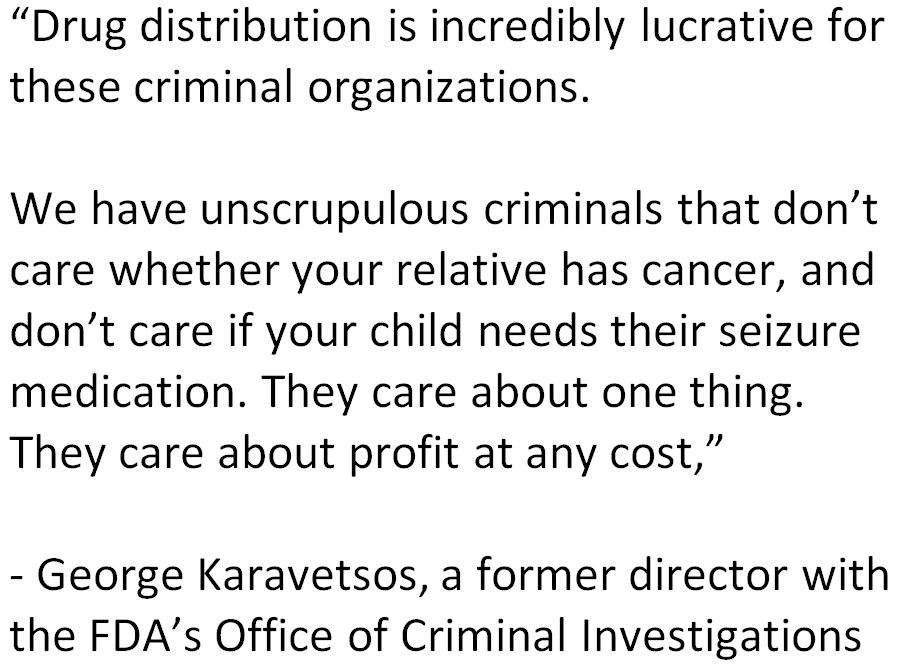The Fallacy of Drug Importation
Former Federal Regulators, Law Enforcement Officials Dispute Rhetoric on Drug Importation Merits, Highlight the Serious Harm Posed to Patient Health
Washington, D.C. — In one of the strongest challenges to drug importation proposals to date, several former federal law enforcement officials and public health experts warned of serious consequences in opening up the U.S. drug supply to Canada and foreign countries during a panel briefing hosted by the Partnership for Safe Medicines on April 4th.
 Recent Congressional proposals call for allowing importation of prescription drugs from Canada based on the assumption that these are the same drugs available to Canadian citizens. Yet, Canadian law imposes strict limits on drug distribution, requiring its citizens to access medicines only through the Health Canada system. The country does not allow Canadian pharmacists to fill prescriptions from American doctors. This means U.S. patients currently seeking or purchasing drugs from alleged Canadian pharmacies are likely receiving medicines from sources outside of the country—drugs that have not been approved or reviewed by Canadian regulators or the U.S. Food and Drug Administration (FDA).
Recent Congressional proposals call for allowing importation of prescription drugs from Canada based on the assumption that these are the same drugs available to Canadian citizens. Yet, Canadian law imposes strict limits on drug distribution, requiring its citizens to access medicines only through the Health Canada system. The country does not allow Canadian pharmacists to fill prescriptions from American doctors. This means U.S. patients currently seeking or purchasing drugs from alleged Canadian pharmacies are likely receiving medicines from sources outside of the country—drugs that have not been approved or reviewed by Canadian regulators or the U.S. Food and Drug Administration (FDA).
“This is the greatest fallacy of the whole situation with importation,” Carmen Catizone, Executive Director of the National Association of Boards of Pharmacy said. “Illegal Internet pharmacies simply slap a maple leaf on their website but can’t sell products that have been approved in Canada to U.S. patients. That’s why they are buying medicines from outside Canada and sending those to U.S. patients when those medications would be prohibited from being distributed to Canadian patients as well.”
The U.S. drug supply represents a closed system where each step in the supply chain is regulated—from manufacturers, distributors, pharmacists, and doctors. This system ensures patients receive safe, effective medications and treatments. However, this regulatory approach is not shared by other countries. All of the panelists highlighted the implications of exposing the American drug supply to sources that regularly contend with illicit or counterfeit drugs. Given the growing number of illicit actors actively engaged in infiltrating the U.S. drug supply with these counterfeit products, importation would open the floodgates to criminal organizations seeking to capitalize on harming the public health.
“[Drug distribution] is incredibly lucrative for these criminal organizations. We have unscrupulous criminals that don’t care whether your relative has cancer, and don’t care if your child needs their seizure medication. They care about one thing. They care about profit at any cost,” said George Karavetsos, a former director with the FDA’s Office of Criminal Investigations, now at DLA Piper.
Karavetsos also added that while the FDA has had positive and increased collaboration from its counterparts overseas, the vast resources needed to protect patients from imported drugs makes such proposals infeasible. “[Importation] would require significant increases in budget and staffing, and even with all of that, I don’t think you are sufficiently able to handle the volume of drugs that is pouring into this country. You are going to be asking regulators from the FDA and other agencies to interpret Canadian law, and they aren’t equipped to do that. You would have to revamp the entire regulatory structure that we currently have today.”

Louis J. Freeh, former director of the Federal Bureau of Investigation, who took an active role in overseeing federal investigations and prosecution of criminal and illicit drug activity, pointed to patient and consumer education as one of the important steps that policymakers can take when it comes to drug safety. While many patients may believe they are purchasing the same medicines as the ones that are available here in the U.S., there is little awareness about the illicit and criminal activity that drives drug distribution and supply in countries overseas.
“The pressure to remove some of these checks and balances isn’t a good cost/benefit analysis,” Freeh said, regarding drug importation proposals. “This is why education is important. Congress might be well-served to hear the testimony and evidence on the law enforcement implications of the bill, and refocus their efforts on education for the public.”
The discussion also featured Tom Kubic, former Deputy Assistant Director of the FBI; Samuel J. Louis, Strasburger & Price and former Deputy Criminal Chief for the Department of Justice (DOJ); Dr. Andrew C. von Eschenbach, former Commissioner, U.S. Food and Drug Administration (FDA); Kenneth C. McCall, Associate Professor, College of Pharmacy, University of New England; Clive Timmons, Head of Global Security, Novartis; Aaron Graham, Executive Director, Brand Safety & Security, Boehringer Ingelheim; and Amy Lyons, Vice President, Corporate Security, Bristol-Myers Squibb.